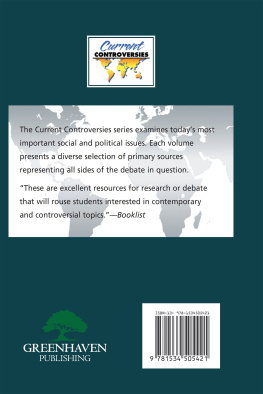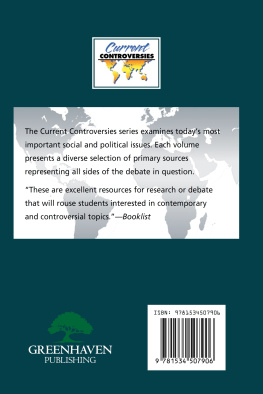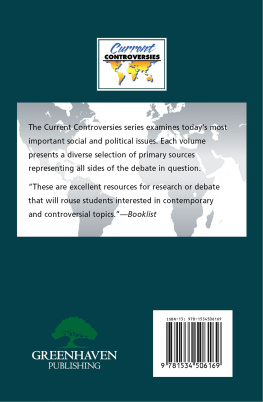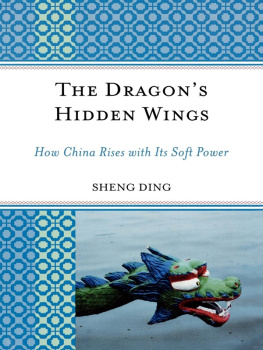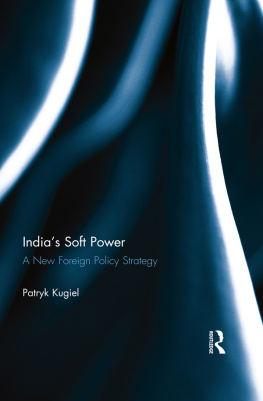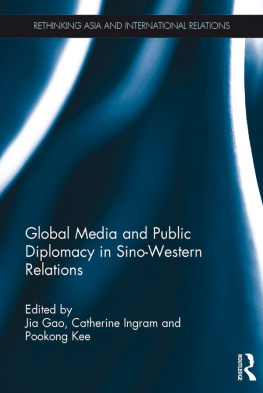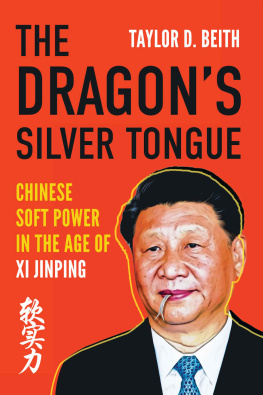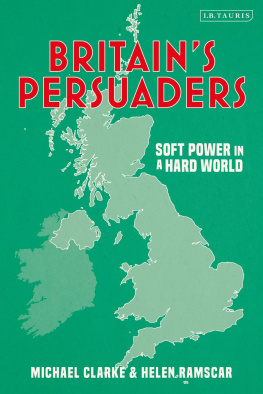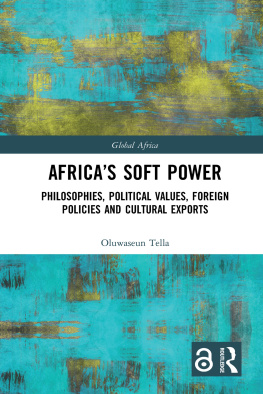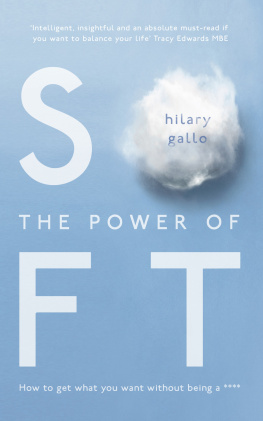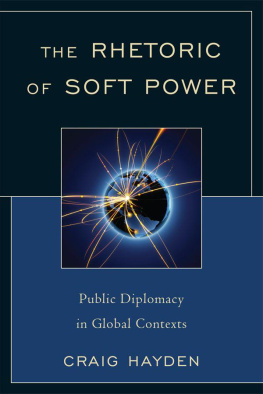

Soft Power and Diplomacy
Other Books in the Current Controversies Series
Antifa and the Radical Left
Cryptocurrencies and Blockchain Technology
The Economics of Clean Energy
Globalization
Historical Revisionism
The Industrial Food Complex
Interference in Elections
Learned Helplessness, Welfare, and the Poverty Cycle
Tariffs and the Future of Trade
The Two-Party System in the United States
Whistleblowers
Published in 2020 by Greenhaven Publishing, LLC
353 3rd Avenue, Suite 255, New York, NY 10010
Copyright 2020 by Greenhaven Publishing, LLC
First Edition
All rights reserved. No part of this book may be reproduced in any form without permission in writing from the publisher, except by a reviewer.
Articles in Greenhaven Publishing anthologies are often edited for length to meet page requirements. In addition, original titles of these works are changed to clearly present the main thesis and to explicitly indicate the authors opinion. Every effort is made to ensure that Greenhaven Publishing accurately reflects the original intent of the authors. Every effort has been made to trace the owners of the copyrighted material.
Cover image: Alexandros Michailidis/Shutterstock.com
Library of Congress Cataloging-in-Publication Data
Names: Heing, Bridey, editor.
Title: Soft power and diplomacy / Bridey Heing, book editor.
Description: New York: Greenhaven Publishing, 2020. | Series: Current controversies | Audience: Grades: 9 to 12. | Includes bibliographical references and index.
Identifiers: LCCN 2018061347| ISBN 9781534505421 (library bound) | ISBN 9781534505438 (pbk.)
Subjects: LCSH: International relationsJuvenile literature. | DiplomacyJuvenile literature.
Classification: LCC JZ1305 .S664 2020 | DDC 327.2dc23
LC record available at https://lccn.loc.gov/2018061347
Manufactured in the United States of America
Website: http://greenhavenpublishing.com
Contents
Jan Melissen
Melissen argues that international relations in the twentieth and twenty-first centuries have been shaped more by public diplomacy than by traditional state diplomacy, a change that experts are still learning how to manage.
Yes: Soft Power Benefits International Peace
Francesca Centracchio
Centracchio shows how soft power has allowed Brazil, an emerging power, to gain influence in business, international affairs, and culture, making a case for why soft power is the dominant force for diplomacy in the twenty-first century.
David Ensor
Ensor argues that soft power can shape political action, using the example of US coverage of ISIS war crimes and the ways in which such coverage drove awareness and state policy.
No: Soft Power Exacerbates Power Imbalances Between States
Michael Cecire
Looking at the annexation of Crimea by Russia, Cecire argues that the Ukraine crisis highlights the weaknesses of soft power and the difficulty in leveraging it in the face of hard power.
Deborah Bull
Bull argues that while there is much talk about the impact of culture on soft power, there is no evidence that cultural diplomacy is effective or meaningful in terms of political power.
Melissa Nisbett
Nisbitt argues that global competition has undermined efforts at global cooperation and that today soft power works to maintain traditional power structures among states, rather than helping less powerful states negotiate as equals.
Robert McMahon
McMahon points to examples of diplomacy and hard power being used effectively not just to counter hostile states but to build common ground upon which functional relations can be established.
Yes: Diplomacy Can Build Effective and Lasting Relationships
Mark Leonard
Leonard looks at how the end of the Cold War was driven by public diplomacy rather than hard power and how soft power played an important role in shaping how citizens and officials saw various countries and opened up opportunities for shifts in relations.
John Weinbrenner
Weinbrenner argues that, in the case of Latin America, hard power has created situations that are counter to US interests, while soft power has helped forge stronger, lasting relationships that better serve both the US and the countries with which it works.
No: Diplomacy Does Not Allow a State to Exert Influence Meaningfully
Allison Fedirka
Fedirka argues that although soft power can build relationships that serve a states interests, hard power is required to exert influence and authority. Leadership on the world state, she argues, has to be built on hard power, rather than soft power.
Colin S. Gray
Gray argues that hard power remains a critical tool for securing US interests and that while soft power can be useful, it is not a valuable or substantially reliable tool for coercing hostile states to work with or benefit the United States.
Brad Macdonald
Macdonald looks to historical examples to explain why diplomacy is not enough to bring about peace, as diplomatic efforts without the military force to back them up often fall flat.
Clifton Martin and Laura Jagla
Jagla and Martin examine the ways in which social media is changing state communications, the challenges these shifts pose, and the ways it could transform public diplomacy.
Yes: Social Media Allows for New Forms of Public Diplomacy
William Rugh
Rugh looks at how social media is changing US public diplomacy efforts in the Middle East, offering both new opportunities and unique challenges in a part of the world that has been difficult for the US to communicate with effectively.
Constance Duncombe
Duncombe argues that social media, like Twitter, creates new opportunities for states to engage with one another and with their own representation. She points to the Iran deal of 2015 as an example of how Twitter has become a wide-ranging tool of public diplomacy.
No: Social Media Hurts Diplomatic Efforts
Luis Gmez Romero
Gmez Romero argues that social media undermines relations and creates aggressive environments when used unwisely, highlighting the ways in which US-Mexico relations eroded due to President Trumps use of Twitter.
Michelle Bove
Bove argues that while Twitter can be a strategic tool, it can also become ineffective and dangerous when used erratically. This unpredictability is a disadvantage that detracts from official diplomatic channels, she argues.
Constance Duncombe
While Duncombe points out that social media can have certain positive impacts on diplomacy, she asserts that the formal assemblies and meetings between state leaders that have long characterized international diplomacy will not become irrelevant anytime soon, nor should they.
Aigerim Raimzhanova
Raimzhanova explores the uses of hard and soft power, and the idea of smart power as the balance of the two.
Yes: Diplomacy and Military Power Complement One Another
William Inboden
Inboden argues that military strength and diplomatic strategy complement one another, and that both are necessary to establish and build on US interests abroad.
Senator Rand Paul and Isaac Applbaum
The authors argue that in a world where diplomatic alliances change rapidly, hard and soft power are important tools to help ensure US security and interests.
Next page
